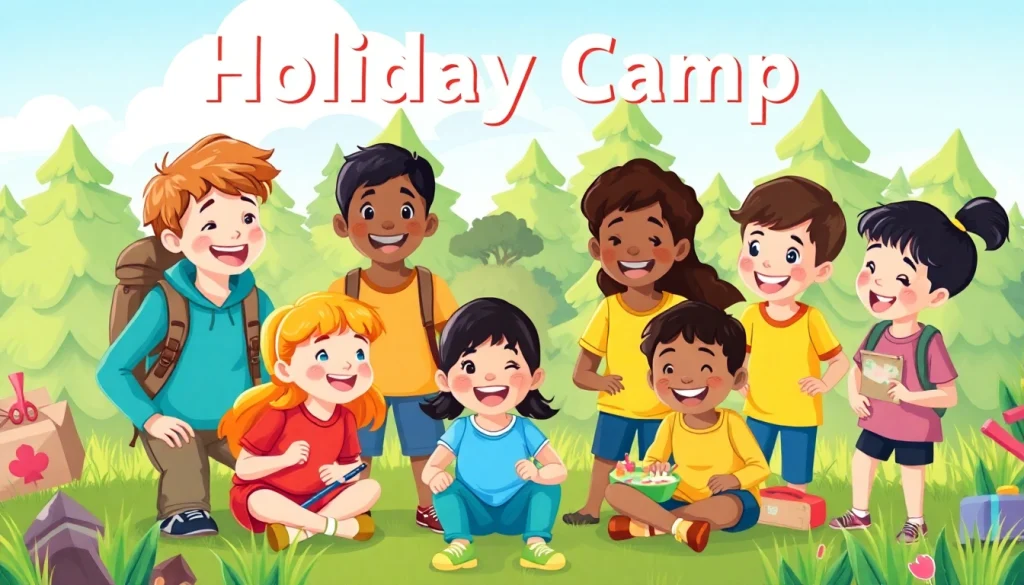Exciting Holiday Camps for Unforgettable Adventures and Learning

Understanding Holiday Camps
Holiday camps have become a popular choice for families seeking a unique blend of relaxation, adventure, and skill-building activities. With offerings that cater to children of all ages, these camps provide an opportunity for youngsters to explore new interests while making lasting friendships. They act as all-in-one destinations where families can benefit from a wide range of organized recreational activities, all while ensuring a safe and comfortable environment. If you’re considering a memorable getaway, holiday camps may hold the key to an unforgettable experience for your children.
What Are Holiday Camps?
Holiday camps, often characterized as organized programs offering lodging, meals, and a variety of activities collectively designed to entertain and educate children, can take many forms. Predominantly found in the UK, these camps cater to a wide demographic, providing structured environments for kids during school breaks or holidays. Unlike traditional summer camps, which may offer overnight stays, holiday camps often focus on daytime activities, allowing parents to drop off and pick up their children on a daily basis.
Types of Holiday Camps Available
Holiday camps offer an array of choices to parents, each catering to different interests and age groups. They can be categorized into several types:
- Adventure Camps: Focused on outdoor activities such as hiking, kayaking, and nature exploration.
- Sports Camps: These camps emphasize physical activities, often specializing in one particular sport, such as soccer, basketball, or swimming.
- Arts and Crafts Camps: Aimed at nurturing creativity, these camps typically provide supplies and instruction for various art forms, including painting, sculpture, and crafting.
- Academic Camps: These focus on specific subjects or skills such as coding, science, or writing, providing a unique learning experience during holiday breaks.
- Day Camps: Suitable for younger children, these provide a safe, structured environment with a variety of activities to choose from without the overnight stay.
- Special Needs Camps: Tailored to accommodate children with physical or developmental challenges, ensuring inclusive environments that foster growth and friendship.
Benefits of Attending Holiday Camps
Beyond mere entertainment, holiday camps offer a plethora of benefits:
- Social Interaction: Kids engage with peers, helping them develop essential social skills.
- Independence: Attending camp fosters self-reliance, as children learn to navigate new environments and situations on their own.
- Skill Development: Whether learning a new sport or honing artistic talents, camps provide opportunities for children to develop and practice various skills.
- Physical Activity: With a focus on movement and exploration, camps promote a healthy lifestyle and physical well-being.
- Lasting Memories: The unique experiences provided by holiday camps often become cherished memories that children will remember fondly throughout their lives.
Choosing the Right Holiday Camp
When selecting a holiday camp, parents face an array of options, making it crucial to choose one that best fits the child’s interests and needs. A well-suited camp can make all the difference in ensuring a positive and memorable experience.
Factors to Consider When Selecting a Camp
Before enrolling your child in a holiday camp, several key factors should be considered:
- Age and Maturity Level: Ensure the camp is age-appropriate and caters to your child’s maturity level.
- Interests and Preferences: Look for a camp that aligns with your child’s hobbies, whether they be sports, arts, or academic pursuits.
- Referrals and Reviews: Seek recommendations from other parents and read reviews to assess the camp’s reputation.
- Location and Accessibility: Factor in travel time and identify whether the camp is easily reachable.
- Customization: Some camps offer customizable schedules or activities, tailoring the experience to meet children’s specific interests.
- Safety Standards: Investigate the camp’s safety protocols, staff-to-child ratios, and how they handle emergencies.
Top Holiday Camps by Region
When considering holiday camps, regional variations can still offer a rich experience. Below are some noteworthy examples from different areas:
- The UK: Facilities such as Butlins and Haven provide comprehensive programs filled with recreational activities suitable for families.
- The US: Camps like Camp Sunshine in Maine emphasize social skill development while offering a safe and memorable environment.
- Australia: Holiday camps like Camp Koolaburra balance fun and adventure, designed for kids who enjoy the outdoors and water sports.
Reviews and Testimonials from Parents
Before committing, reading reviews can provide insight into the experiences of other families. Parents often share feedback highlighting unique aspects of particular camps, such as quality of instruction, engagement levels, and how children thrived during their time there. It’s worth investigating family blogs, review sites, and social media pages where parents exchange their thoughts and experiences.
Activities Offered at Holiday Camps
The heart of any holiday camp lies in its activities. These programs are designed to engage children and encourage them to explore interests, develop skills, and most importantly, have fun!
Arts and Crafts: Encouraging Creativity
Many holiday camps incorporate arts and crafts as a central part of their curriculum. From painting to pottery, these activities allow children to express creativity and learn new techniques. Not only does this help to develop fine motor skills, but it also enhances their ability to think creatively and outside the box. Some camps even hold exhibitions, where children showcase their artwork to fellow campers and parents, fostering a sense of pride and accomplishment.
Outdoor Adventures: Engaging with Nature
Adventure-based activities are another staple of holiday camps. Outdoor expeditions might include supervised hikes, nature walks, and even climbing activities. Such experiences aid in building physical stamina, confidence, and a connection with nature. Children learn importance of teamwork through activities like group kayaking or obstacle courses, which not only strengthens camaraderie but also improves communication skills.
Sports and Team-building Activities
For active children, sports camps are a dream come true. Offering everything from soccer to archery, these camps enable children to participate in their favorite sports while developing teamwork and leadership skills. Structured competitions also teach them about sportsmanship, resilience, and goal-setting—valuable life skills that extend beyond the playing field.
Preparing for Holiday Camp
Once you’ve selected the ideal holiday camp, preparation is key to ensuring your child has a positive experience. This involves more than just packing a bag—it’s about setting the stage for a successful adventure.
What to Pack for Your Camp Experience
Parents should provide their children with a tailored packing list to ensure they come prepared. Bring items typically include:
- Comfortable clothing suitable for varied weather conditions.
- Sunscreen and protective gear for outdoor activities.
- Personal hygiene products and a water bottle.
- Comfort items such as a favorite stuffed animal or blanket, especially for younger kids.
It’s also recommended to label all personal items to prevent them from getting lost during the camp activities.
Safety Tips for Parents and Campers
Ensuring the safety of campers should always be the top priority. Parents should read the camp’s safety guidelines beforehand and discuss them with their children. Teach kids the importance of following camp rules, understanding emergency procedures, and knowing how to communicate any concerns to their camp counselors.
Understanding Camp Schedules and Formats
Most holiday camps operate on a structured schedule, balancing planned activities with free time. Parents should familiarize themselves with the schedule so they can discuss it with their children, allowing for a smoother transition and a better understanding of what to expect.
The Impact of Holiday Camps on Children
Participating in holiday camps goes beyond short-term entertainment; it can significantly impact a child’s long-term development. The experiences children face in camp amplify their growth and learning in ways that can carry into adulthood.
Social Skills Development in Holiday Camps
One of the most notable benefits of holiday camps is their focus on social skill development. Kids learn to interact with peers in a safe, supportive environment. They practice essential skills such as cooperation, negotiation, and conflict resolution, which can enhance their ability to form meaningful relationships as they grow.
Boosting Confidence and Independence
Independence is a key component of the holiday camp experience. Campers often face new challenges away from home, whether it’s trying a new activity or overcoming fear. Success in these endeavors cultivates self-esteem and confidence. Children often return home with a newfound sense of adaptability and resilience.
Long-term Benefits of Camp Experiences
The impact of holiday camp experiences can extend far beyond the brief time spent attending. Research shows that children who regularly participate in camps tend to develop better social skills, higher confidence levels, and enhanced emotional intelligence. As they progress into adulthood, these foundational experiences provide them with the skills necessary to navigate life’s complexities successfully.







